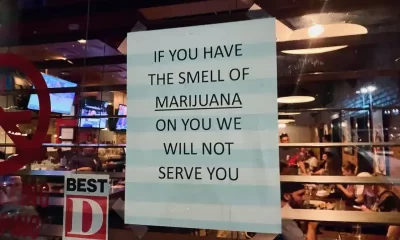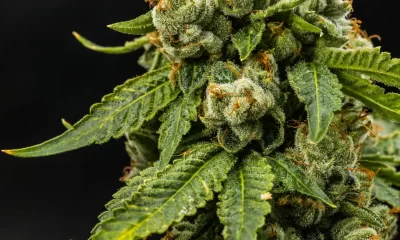Business
Security Clearance Can’t Be Denied for Intelligence Agency Employees, According to Senate Committee

Those who apply for intelligence agency jobs with the FBI, CIA, or NSA can’t be denied security clearance because of past cannabis use.
The Senate Select Committee on Intelligence passed the FY24 Intelligence Authorization Act in a 17-0 vote on June 14, which includes a provision that prevents discrimination or denial of jobs in government intelligence agencies.
The bill was proposed by Sen. Ron Wyden, a senior member of the committee. “This bill includes historic bipartisan legislation reforming the country’s broken classification and declassification system,” said Wyden in a press release. “The bill also includes my provision to ensure that cannabis use will not disqualify intelligence community applicants from serving their country. It’s a commonsense change to ensure the IC [intelligence community] can recruit the most capable people possible. Finally, the bill includes critically important provisions to protect Intelligence Community whistleblowers.”
Previously in June 2022, Wyden filed an amendment that “prohibited any Federal agency from denying or revoking an individual’s eligibility for access to classified information solely because of past or present use of cannabis” last year. A second-degree amendment reduced to only intelligence agencies, including the Federal Bureau of Intelligence (FBI), Central Intelligence Agency (CIA), and National Security Agency (NSA). The original text which described “past or present use” was changed to “pre-employment.”
Later in September 2022, Wyden’s proposal was met with opposition from Sen. Chuck Grassley and Sen. John Cornyn who objected to its inclusion in the National Defense Authorization Act (NDAA).
According to Chairman Mark Warner, the FY24 Intelligence Authorization Act “furthers the Committee’s efforts to reform the security clearance process, so that the IC can attract and expeditiously on-board a talented, diverse, and trusted workforce to meet the emerging challenges we face.”
On March 8, Director of National Intelligence Avril Haines addressed the need for security clearance inclusions. “We recognize, frankly, that many states have legalized or decriminalized marijuana use and wanted to be sure that we’re not disqualifying people solely for that purpose in that context,” Haines said at the hearing.
“We obviously believe that we want to have the talent that exists in America—and when somebody is using it [cannabis] experimentally in a legal state that’s something that shouldn’t on its own essentially disqualify,” Haines continued. “We continue to approach this from a whole-person perspective. And we expect if anybody takes the job to comply with our policies and our laws in a trusted position.”
The discussion of security clearance for cannabis users goes further back to a memo from Haines in January 2022, following up from guidance signed in December 2021.
Other federal agencies have addressed cannabis consumption as well.
Back in 2014, former FBI Director James Comey suggested that the agency should consider loosening employment rules for cannabis. “I have to hire a great work force to compete with those cyber criminals and some of those kids want to smoke weed on the way to the interview,” Comey said, according to an interview with Wall Street Journal.
The FBI originally disqualified any applicants of they had consumed cannabis within the past three years of their application. Now as of July 2021, the rule applies to cannabis use within one year.
In March, the Bureau of Alcohol, Tobacco, Firearms and Explosives revised its rules so that anyone who has legally cultivated, manufactured or sold cannabis would still be considered for a job. However, those who did so in violation of state law would be disqualified.
In May, the U.S. Secret Service (USSS) updated its rules on cannabis use for applicants, stating that those who have used hemp-derived CBD products within one year prior to their application would be reviewed “on a case-by-case basis by adjudicative personnel.” Previously, the USSS based its rules around age, where 24 years or younger could apply after one year free of cannabis consumption, but 28 and older would not be eligible for at least five years after consumption.
Business
New Mexico cannabis operator fined, loses license for alleged BioTrack fraud

New Mexico regulators fined a cannabis operator nearly $300,000 and revoked its license after the company allegedly created fake reports in the state’s traceability software.
The New Mexico Cannabis Control Division (CCD) accused marijuana manufacturer and retailer Golden Roots of 11 violations, according to Albuquerque Business First.
Golden Roots operates the The Cannabis Revolution Dispensary.
The majority of the violations are related to the Albuquerque company’s improper use of BioTrack, which has been New Mexico’s track-and-trace vendor since 2015.
The CCD alleges Golden Roots reported marijuana production only two months after it had received its vertically integrated license, according to Albuquerque Business First.
Because cannabis takes longer than two months to be cultivated, the CCD was suspicious of the report.
After inspecting the company’s premises, the CCD alleged Golden Roots reported cultivation, transportation and sales in BioTrack but wasn’t able to provide officers who inspected the site evidence that the operator was cultivating cannabis.
In April, the CCD revoked Golden Roots’ license and issued a $10,000 fine, according to the news outlet.
The company requested a hearing, which the regulator scheduled for Sept. 1.
At the hearing, the CCD testified that the company’s dried-cannabis weights in BioTrack were suspicious because they didn’t seem to accurately reflect how much weight marijuana loses as it dries.
Company employees also poorly accounted for why they were making adjustments in the system of up to 24 pounds of cannabis, making comments such as “bad” or “mistake” in the software, Albuquerque Business First reported.
Golden Roots was fined $298,972.05 – the amount regulators allege the company made selling products that weren’t properly accounted for in BioTrack.
The CCD has been cracking down on cannabis operators accused of selling products procured from out-of-state or not grown legally:
- Regulators alleged in August that Albuquerque dispensary Sawmill Sweet Leaf sold out-of-state products and didn’t have a license for extraction.
- Paradise Exotics Distro lost its license in July after regulators alleged the company sold products made in California.
Golden Roots was the first alleged rulebreaker in New Mexico to be asked to pay a large fine.
Source: https://mjbizdaily.com/new-mexico-cannabis-operator-fined-loses-license-for-alleged-biotrack-fraud/
Business
Marijuana companies suing US attorney general in federal prohibition challenge

Four marijuana companies, including a multistate operator, have filed a lawsuit against U.S. Attorney General Merrick Garland in which they allege the federal MJ prohibition under the Controlled Substances Act is no longer constitutional.
According to the complaint, filed Thursday in U.S. District Court in Massachusetts, retailer Canna Provisions, Treevit delivery service CEO Gyasi Sellers, cultivator Wiseacre Farm and MSO Verano Holdings Corp. are all harmed by “the federal government’s unconstitutional ban on cultivating, manufacturing, distributing, or possessing intrastate marijuana.”
Verano is headquartered in Chicago but has operations in Massachusetts; the other three operators are based in Massachusetts.
The lawsuit seeks a ruling that the “Controlled Substances Act is unconstitutional as applied to the intrastate cultivation, manufacture, possession, and distribution of marijuana pursuant to state law.”
The companies want the case to go before the U.S. Supreme Court.
They hired prominent law firm Boies Schiller Flexner to represent them.
The New York-based firm’s principal is David Boies, whose former clients include Microsoft, former presidential candidate Al Gore and Elizabeth Holmes’ disgraced startup Theranos.
Similar challenges to the federal Controlled Substances Act (CSA) have failed.
One such challenge led to a landmark Supreme Court decision in 2005.
In Gonzalez vs. Raich, the highest court in the United States ruled in a 6-3 decision that the commerce clause of the U.S. Constitution gave Congress the power to outlaw marijuana federally, even though state laws allow the cultivation and sale of cannabis.
In the 18 years since that ruling, 23 states and the District of Columbia have legalized adult-use marijuana and the federal government has allowed a multibillion-dollar cannabis industry to thrive.
Since both Congress and the U.S. Department of Justice, currently headed by Garland, have declined to intervene in state-licensed marijuana markets, the key facts that led to the Supreme Court’s 2005 ruling “no longer apply,” Boies said in a statement Thursday.
“The Supreme Court has since made clear that the federal government lacks the authority to regulate purely intrastate commerce,” Boies said.
“Moreover, the facts on which those precedents are based are no longer true.”
Verano President Darren Weiss said in a statement the company is “prepared to bring this case all the way to the Supreme Court in order to align federal law with how Congress has acted for years.”
While the Biden administration’s push to reschedule marijuana would help solve marijuana operators’ federal tax woes, neither rescheduling nor modest Congressional reforms such as the SAFER Banking Act “solve the fundamental issue,” Weiss added.
“The application of the CSA to lawful state-run cannabis business is an unconstitutional overreach on state sovereignty that has led to decades of harm, failed businesses, lost jobs, and unsafe working conditions.”
Business
Alabama to make another attempt Dec. 1 to award medical cannabis licenses

Alabama regulators are targeting Dec. 1 to award the first batch of medical cannabis business licenses after the agency’s first two attempts were scrapped because of scoring errors and litigation.
The first licenses will be awarded to individual cultivators, delivery providers, processors, dispensaries and state testing labs, according to the Alabama Medical Cannabis Commission (AMCC).
Then, on Dec. 12, the AMCC will award licenses for vertically integrated operations, a designation set primarily for multistate operators.
Licenses are expected to be handed out 28 days after they have been awarded, so MMJ production could begin in early January, according to the Alabama Daily News.
That means MMJ products could be available for patients around early March, an AMCC spokesperson told the media outlet.
Regulators initially awarded 21 business licenses in June, only to void them after applicants alleged inconsistencies with how the applications were scored.
Then, in August, the state awarded 24 different licenses – 19 went to June recipients – only to reverse themselves again and scratch those licenses after spurned applicants filed lawsuits.
A state judge dismissed a lawsuit filed by Chicago-based MSO Verano Holdings Corp., but another lawsuit is pending.
Source: https://mjbizdaily.com/alabama-plans-to-award-medical-cannabis-licenses-dec-1/
-

 Business2 years ago
Business2 years agoPot Odor Does Not Justify Probable Cause for Vehicle Searches, Minnesota Court Affirms
-

 Business2 years ago
Business2 years agoNew Mexico cannabis operator fined, loses license for alleged BioTrack fraud
-

 Business2 years ago
Business2 years agoAlabama to make another attempt Dec. 1 to award medical cannabis licenses
-

 Business2 years ago
Business2 years agoWashington State Pays Out $9.4 Million in Refunds Relating to Drug Convictions
-

 Business2 years ago
Business2 years agoMarijuana companies suing US attorney general in federal prohibition challenge
-

 Business2 years ago
Business2 years agoLegal Marijuana Handed A Nothing Burger From NY State
-

 Business2 years ago
Business2 years agoCan Cannabis Help Seasonal Depression
-

 Blogs2 years ago
Blogs2 years agoCannabis Art Is Flourishing On Etsy













